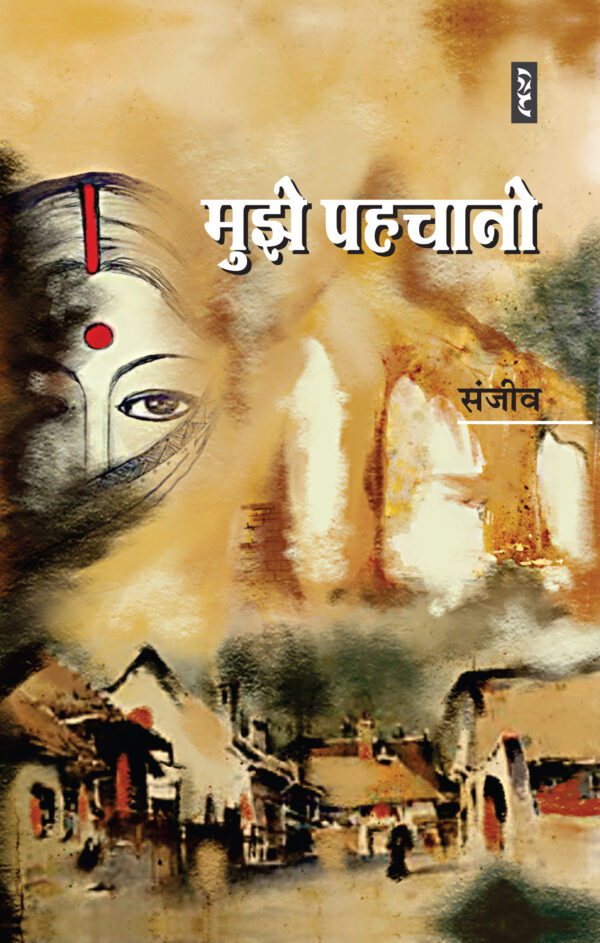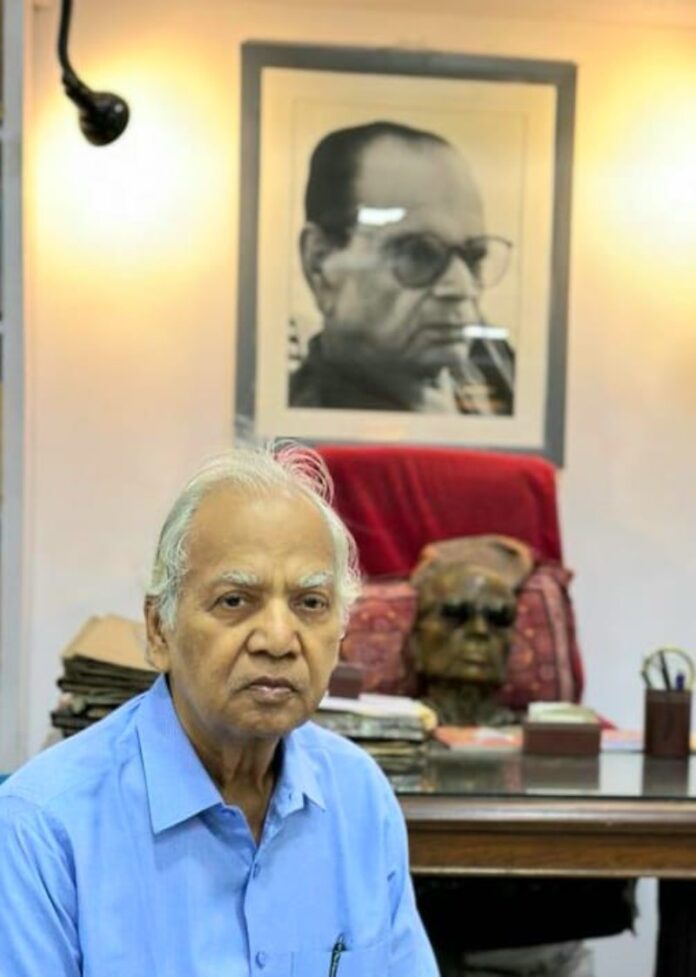Sanjeev, the luminary of literary fiction, recently ascended to the summit of distinction by clinching the Sahitya Akademi Award 2023 (Hindi) for his magnum opus, “Mujhe Pehchano.” This narrative masterpiece unfurls around the enigmatic life of Raja Ram Mohan Roy’s sister-in-law, a pivotal figure in the tapestry of the Indian Renaissance. Illuminating the dark corridors of Sati’s oppression, the novel becomes a profound exploration into the exploitation of women, a poignant reflection on the intricacies plaguing both contemporary and antiquated facets of Indian society.
In the tapestry of Sanjeev’s literary oeuvre, the clarion call of progressiveness resounds with unwavering intensity. Significantly, the novels emerge as veritable bastions of this resonant voice, eclipsing the resonance found in his succinct short stories. This ascendancy is credited to the expansive and finely woven tapestries of his narratives, which find their apotheosis in the sprawling landscape of the novel.
A paragon of his narrative prowess lies encapsulated in the epic “Phans,” an opus elucidating the tribulations besieging the agrarian denizens of Vidarbha. With deft strokes, it delineates the labyrinthine predicament of Indian tillers ensnared in the web of post-modernity, proffering a kaleidoscopic view. The novel seamlessly aligns with his shorter tales, mirroring the stark social verities encountered by Dalits and the proletarian echelons.
Sanjeev, with unbridled eloquence, thrusts the reader into the fray, portraying the clash between the lofty echelons of the Hindu social order and the disenfranchised Dalits and Adivasis, underscoring the stranglehold exerted by religious dogmas and societal mores—a vice denoted by the metaphor “phans.”
In the pantheon of Hindi literature, Sanjeev emerges as an unparalleled luminary, a staunch advocate for the marginalized, both in his literary opuses and ideological stance. His indomitable spirit, coupled with a discerning maturity, elevates him to the echelons of literary eminence.
In a privileged engagement with The Interview World, Sanjeev, the esteemed wordsmith behind the literary opus entitled “Mujhe Pehchano,” unveils his profound sentiments after being bestowed with the distinguished Sahitya Akademi Award of 2023. Within the sanctity of this exchange, he imparts a treasury of hitherto undisclosed narratives. Presented herewith are the pivotal fragments derived from his illuminating colloquy.
Q: What was your first reaction after getting the Sahitya Academy Award for 2023?
A: Numerous messages have reached me, expressing gratitude for our belated encounters. Some individuals have underscored the significance of timely justice, equating its delay to a betrayal of justice itself. Nevertheless, I extend my gratitude to those who have endorsed my name, transcending past prejudices. I humbly acknowledge their efforts in sidelining antiquated biases.
It is my sincere hope that they continue championing justice, enabling the talents of India to thrive. In my academic journey as a science student, biases were notably absent; however, the realm of literature presents an entirely different narrative… one that is challenging to articulate!
Q: Rajendra Yadav and Mannu Bhandari have made significant contributions to enriching your literary world. How are they being remembered after the announcement of the award?
A: Life is undeniably expansive, and Rajendra Ji’s impact on my journey has been akin to that of a paternal figure. Without his presence, my contemplations on various matters wouldn’t have reached the depth they have. It resembles the caring dynamics of parental guidance, where influences come from different directions.
However, resisting the weight of my words was not an option for him. This familial connection resulted in a compassionate support network from all corners; affection poured in from individuals like Vijaydan Detha and Sharad Joshi. Rajendra Ji, in particular, harbored perhaps higher expectations from me. I am pleased to share that I fulfilled whatever expectations he held.
Q: You received recognition for your novel “Mujhe Pehchano.” Is it your best work, or do you consider another work to be the best?
A: I endeavored to complete all of my narratives, and the culmination of these efforts can be found in my collective body of work. I attribute the refinement of my writings to the influence of notable individuals, particularly Rajendra Yadav and Mannu Bhandari. Their impact on my creative expression has been significant.
For instance, the novel ‘Kishangarh Ke Aheri’ garnered appreciation from Dharma Bir Bharati, but faced rejection from Rajendra Ji. His critique was explicit, dismissing it as a fusion of narratives. Subsequently, numerous messages ensued. Some expressed gratitude for having encountered my work belatedly, while others lamented the delayed justice, equating it to a murder of justice.
Despite the varied responses, I express my gratitude to all those who played a role in bringing my name to the forefront. Having started as a science student, where bias was relatively minimal, the literary realm presented an entirely different landscape. It is a distinct narrative, one that is challenging to articulate adequately.
In the aftermath of the rejection of ‘Kishangarh Ke Aheri,’ I embarked on a rewriting journey. Eventually, the revised version found its way to publication through Rajkamal.
Q: What perspective should the new generation or other people entering the Hindi literary world have, and how can they make it better?
A: The initial step entails expressing what lies within the realm of your capability to articulate. Subsequently, a matter of greater significance emerges, emphasizing the imperative not to depict things merely as they exist. It is paramount to cultivate a profound comprehension of the subject matter before engaging in the act of writing. This involves transcending the superficial and refraining from haphazardly scavenging for fragments of information.
Q: You have avoided taking names in your previous interviews and even today, be it your contemporaries or new authors. It’s also said that Sanjeev remains enchanted with his own writings. So, is Sanjeev arrogant?
A: In this brief interview, one must consider a myriad of perspectives. Challenges may arise, leading to a perception of arrogance among friends. The question then arises: What exactly is conveyed with such confidence? The assertion stems from an extensive body of work undertaken. Consequently, the label of arrogance may be attached, as some perceive a self-satisfied demeanor. Few individuals have traversed the world to the extent that I have. Is there an issue with that? Occasionally, excessive speech can inadvertently reveal unintended sentiments.
With your permission…
Post-conversation, myriad thoughts flood the mind. Originating from a humble, working-class background, life’s journey has been arduous. However, it has meandered through diverse paths, transforming the processes of writing, observing, understanding, realizing, and comprehending into sources of joy. Numerous topics beckon discussion, as we revisit some partially explored subjects.
(Shobha Akshar, a distinguished writer, poet, editor, and commentator specializing in literature, cinema, art, and social issues, interviewed Sanjeev on behalf of The Interview World.)



